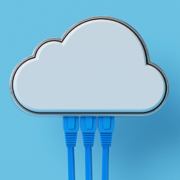What to expect from your cloud security
Although enterprise cloud adoption is at an all-time high, cloud security is still a headache for many organizations. Uncertainties about data security and compliance are some of the biggest hindrances to cloud migration. In a recent study, 75 percent of the surveyed cybersecurity professionals said they were very concerned about data security in public cloud systems.
Concerns over cloud security are not entirely unfounded; minor system misconfigurations, critical oversights, and unauthorized access to cloud services can easily lead to severe data breaches. However, most cloud breaches result from user error or a lapse in judgment on the client’s side.
Let’s look at the level of security you can expect from a cloud service provider in order to understand your security responsibilities as a cloud user:
Impenetrable firewalls
A cloud firewall is a combination of software tools and devices built to stop unauthorized access to cloud services and hosted networks. Cloud systems are too complex for simple packet filter firewalls that only analyze incoming and outgoing packets against some pre-established criteria. A secure cloud system should incorporate intelligent stateful packet inspection (SPI) and proxy server firewalls to mitigate all types of network vulnerabilities.
All-round data encryption
Encryption means scrambling data so that only the verified sender and recipient can decipher the information. The cloud host should provide end-to-end encryption for data transmissions and data-at-rest encryption for information stored on the cloud. Strong encryption minimizes the potential implications of data stolen through man-in-the-middle attacks, unintentional leaks, or malicious server access.
Secure world-class data centers
Cloud services are built around extensive data centers made up of physical equipment such as servers and networking devices. It’s the host’s responsibility to guarantee physical security on the cloud’s hardware. Most data centers have a multi-layered security structure protecting the valuable equipment. Besides data protection, robust physical security also boosts uptime and fault tolerance.
Automated intrusion detection systems
Most data safety and privacy regulations require businesses to have a means of detecting, recording, and logging intrusion attempts on protected data systems. Due to compliance pressure, most cloud services vendors now offer smart intrusion detection capabilities that flag and report suspicious activities and access attempts based on intelligent analysis.
Visibility into cloud infrastructure controls and security
A cloud provider committed to security should be transparent about the cloud’s risks, security policies, and critical configuration settings. Ideally, there should be centralized visibility into the entire cloud infrastructure. Knowing what the cloud service can and cannot do in terms of security reduces the risk of making poor security decisions. It also helps integrate native security solutions into your cloud management framework.
Your cloud security responsibility
Cloud security is a shared responsibility between the service provider and the client. You also have a key role to play in protecting all your data and applications running on the cloud. Many companies are now hiring third-party managed cloud security services to help protect their cloud infrastructures. This trend is growing so rapidly that analysts forecast global cloud security spending to reach $12.6 billion by 2023.
Whether you choose to hire a professional cybersecurity service or go at it alone, here are some additional measures you should consider in minimizing your cloud’s security risks:
- Implement multi-factor authentication on all cloud applications.
- Get user training on cloud security best practices.
- Add extra layers of encryption and firewalls.
- Draft effective company-wide security policies.
- Develop a dependable data backup and recovery system.
- Maintain control of cloud-based user accounts and privileges.
- Route all connections to the cloud through a secure VPN.
- Use up-to-date hardware and software on your end-user devices.
All cloud services are not built equal. It’s important to understand the security capabilities that the cloud host provides so you can determine the risks and fill in any gaps yourself. In most cases, the more default security features available, the more secure the cloud infrastructure.






















